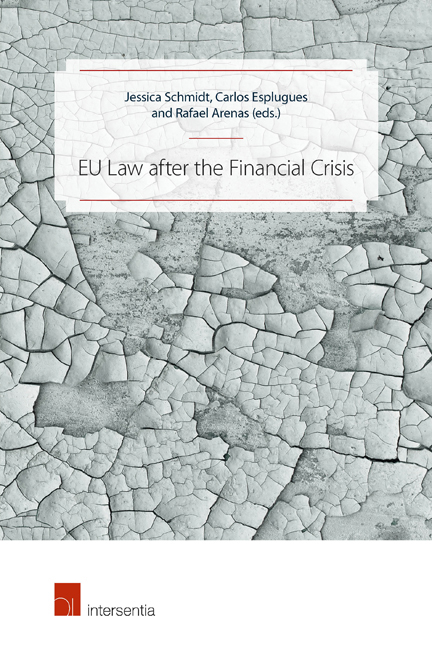Book contents
- Frontmatter
- Contents
- List of Abbreviations
- List of Authors
- Introduction
- PART I RESCUE MECHANISMS AND MONETARY POLICY
- PART II THE IMPACT OF THE FINANCIAL CRISIS ON THE BANKING SECTOR AND CAPITAL MARKETS
- PART III THE FINANCIAL CRISIS AND TAX LAW
- PART IV THE FINANCIAL CRISIS, CONSUMERS AND CONSUMER LAW
- PART V THE FINANCIAL CRISIS AND COMPETITION LAW
- Rethinking Competition Law after the Financial Crisis
- Merger Control and the Financial Crisis. Rescue Mergers and the Failing Firm Defence
- PART VI THE FINANCIAL CRISIS, RESTRUCTURING AND INSOLVENCY LAW
- PART VII THE SOCIAL DIMENSION OF THE FINANCIAL CRISIS AND EU CITIZENSHIP
- PART VIII REFLECTIONS ON THE IMPACT OF THE FINANCIAL CRISIS ON THE GENERAL EUROPEAN LEGAL FRAMEWORK AND THE FUNDAMENTAL “EUROPEAN IDEA”
Rethinking Competition Law after the Financial Crisis
from PART V - THE FINANCIAL CRISIS AND COMPETITION LAW
Published online by Cambridge University Press: 13 December 2017
- Frontmatter
- Contents
- List of Abbreviations
- List of Authors
- Introduction
- PART I RESCUE MECHANISMS AND MONETARY POLICY
- PART II THE IMPACT OF THE FINANCIAL CRISIS ON THE BANKING SECTOR AND CAPITAL MARKETS
- PART III THE FINANCIAL CRISIS AND TAX LAW
- PART IV THE FINANCIAL CRISIS, CONSUMERS AND CONSUMER LAW
- PART V THE FINANCIAL CRISIS AND COMPETITION LAW
- Rethinking Competition Law after the Financial Crisis
- Merger Control and the Financial Crisis. Rescue Mergers and the Failing Firm Defence
- PART VI THE FINANCIAL CRISIS, RESTRUCTURING AND INSOLVENCY LAW
- PART VII THE SOCIAL DIMENSION OF THE FINANCIAL CRISIS AND EU CITIZENSHIP
- PART VIII REFLECTIONS ON THE IMPACT OF THE FINANCIAL CRISIS ON THE GENERAL EUROPEAN LEGAL FRAMEWORK AND THE FUNDAMENTAL “EUROPEAN IDEA”
Summary
Competition lawyers, in all their hubris, love to see the rules on competition (or antitrust) as the fundamental rules of a market economy. According to a continental tradition of competition law, markets only function due to a set of rules provided for by the state (or the Union in a European dimension), defining the boundaries of what undertakings are allowed to do. Those general rules safeguarding the market's freedom from the predatory forces of unlimited freedom may be called “systemic regulation”, as they guarantee the system's functioning and hinder market failure. If this is true, competition law requires a thorough understanding (or at least an informed guess) of how markets work. The Directorate General for Competition in the European Commission explicitly claims that its task is to “make markets work better”. Adam Smith, the founding father of market economics, had already seen that it is important to stop collusion of competitors and to fight monopolies.
The financial crisis has exposed a complete market failure – and a market failure is also the failure of the government that – in our understanding – is responsible for setting the framework for doing business (or the “Ordo” as some German scholars would have it in the tradition of ordoliberalism). Accordingly, the financial crisis should have shattered the self-confidence of competition law enforcers who are responsible for setting and enforcing the rules “to make markets work better”. This responsibility lies with the Directorate General for Competition of the European Commission, and one would expect some reaction of whatever sort from the Directorate to the financial crisis. If it is true that competition law rules are key to working markets, and if markets collapse or fail to perform, one may question the competition law rules in place – or at least their enforcement.
There is an irritating aspect to this: after the financial crisis had struck, the mainstream reaction of competition lawyers was to stick to business as usual.
- Type
- Chapter
- Information
- EU Law after the Financial Crisis , pp. 163 - 186Publisher: IntersentiaPrint publication year: 2016



